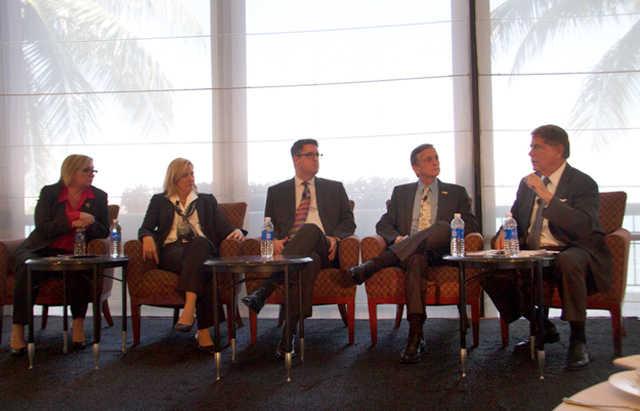
Libraries evolving as spaces for developing community ideas and engagement
Reimagining libraries in the digital age is collaborative work that requires input from across the community–but it’s also essential in building, competitive world-class cities.
That was the framing from Miami-Dade County Mayor Carlos A. Giménez as he introduced a discussion on the “Future of Libraries” at the InterContinental Miami hotel Monday.
“The library forms an integral part of community engagement,” Giménez said. “We must not only serve our diverse community today but keep pace with the global challenges of tomorrow.”
Knight Foundation and The Miami Foundation sponsored the event, which brought national thought leaders together to discuss creative visions for tomorrow’s libraries. This summer the Greater Miami Chamber of Commerce commissioned a survey, with the support of Knight Foundation, on the attitudes of Miami-Dade County residents toward public libraries. Knight, which has a history of funding library initiatives to promote informed and engaged communities, recently closed a $2.5 million News Challenge on libraries, which asked, How might we use libraries as a platform to build more knowledgeable communities? Winners will be announced in January.
Monday’s panelists included: Amy Garmer, director of the Aspen Institute Dialogue on Public Libraries who is developing global solutions to increase access to libraries with the Bill & Melinda Gates Foundation Global Libraries initiative; Corinne Hill, executive director of the Chattanooga Public Library and this year’s librarian of the year; John Szabo, the city librarian at the Los Angeles Public Library, the largest library in the United States; and Kenneth Furton, the executive vice President of Florida International University in Miami.
Knight Foundation President Alberto Ibargüen moderated the conversation, which was live-streamed. The dialogue also engaged a national audience using the hashtag #305libraries on Twitter.
“We want to be relevant in the digital age,” Ibargüen said. “That means making libraries more, not less, important.”
Ibargüen asked panelists what building blocks were required to reimagine libraries and what type of leadership was required to make change possible. He also asked the leaders to identify any national examples of libraries that are setting the standard in community engagement.
Szabo said the public library’s strategy in Los Angeles is to collaborate with community-based organizations to better meet the needs of more than 14 million library-goers.
“We’re a trusted and valued institution and that’s something to be valued.” he said. “It’s something that needs to be leveraged to have impact on some of the biggest issues that we face.”
Szabo says that in maintaining trust with residents, it is important to continually reevaluate those needs. One recent example, he says, is L.A.’s collaboration with the housing authority. Once they identified that young people had limited access to libraries as a result of gang territories, partners developed satellite libraries.
The same fundamental community needs exist at the collegiate level, Furton said. Research shows that both faculty and students have the same fundamental needs, he said.
“Student success is linked to a sense of belonging,” Furton said. “[Libraries] are where students find more of a sense of community; it comes from collaborative working space.”
Hill said the beauty of inheriting what is broken in the library, such as outdated collections that no one uses, is that you can be the one to fix it. After discarding more than a third of the Chattanooga Public Library’s collection, she said circulation has increased by 20 percent; that also made space for makers and entrepreneurs.
“Citizens trust us,” she said. “Our challenge is to think differently. An innovation is only an innovation for a moment of time and the only sustainable thing is our ability to stay true to ourselves and — free from any standard operating procedures — true to our community’s needs.”
As an example, Hill said her community needed “a space to try new stuff,” which was why the 4th Floor public lab has now evolved into a collaborative space for enterprises such as the Chattanooga Open Government Collaborative, an initiative funded by Knight Foundation. She said that, in addition to building partnerships, it’s critical to have the support of city leadership and to also staff the library with individuals who are plugged into the entrepreneurial pulse of the city.
Garmer added the library itself is an investment that can serve as an incubator for the entrepreneurial spirit of any city.
“You need someone who can create a culture of innovation,” Garner said. “The library is traditionally a conservative institution, but now we need leadership that can create a culture where innovation and change, risk — and even failure is OK.” Thought leaders discuss the “Future of Libraries” in Miami, across the globe. Corinne Hill, executive director of the Chattanooga Public Library (left); Amy Garmer, director of the Aspen Institute Dialogue on Public Libraries; John Szabo, the city librarian at the Los Angeles Public Library; and Kenneth Furton, the executive vice president of Florida International University. Knight Foundation President Alberto Ibargüen moderated this discussion. Photo credit: Jenna Buehler